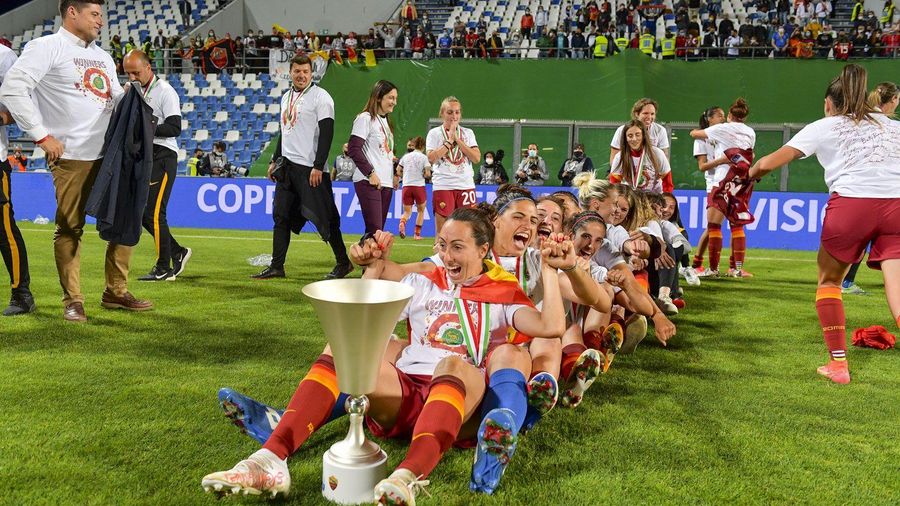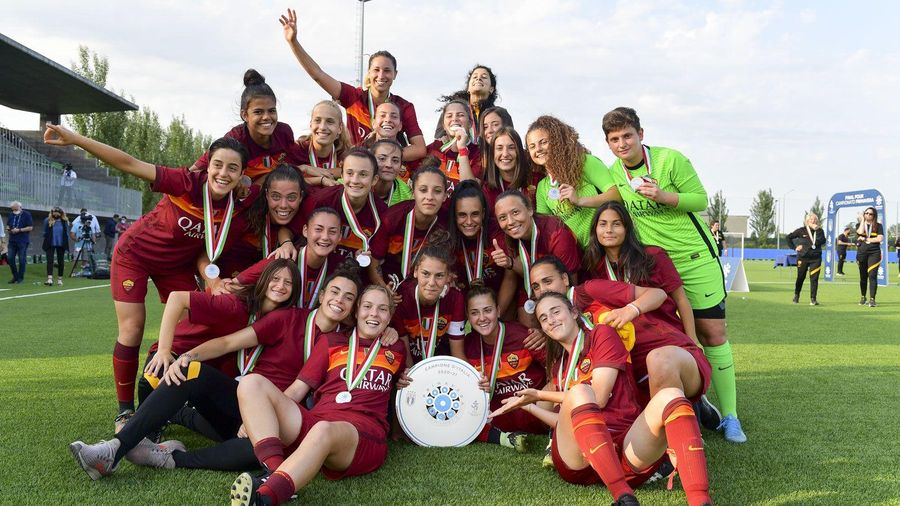
















The tension had been palpable, but it soon gave way to an outpouring of joy.
After two anxious hours and an even more nerve-wracking penalty shootout, Roma Women were Coppa Italia champions.
The 2021 cup final against Milan was the biggest game the Giallorosse had been involved in since they were set up three years ago – and they rose to the challenge.
A game that was competitive and exhausting both mentally and physically, both sides battled until the final whistle of extra time, by which point they still could not be separated.
Penalties determined the outcome of the final, and Roma were the ones celebrating a few moments later.
This content is provided by a third party. Because of the choice you have made about cookies on our
website, the external site does not have permission to display here.
If you would like to see the content, please change your cookie choices using either of the buttons
shown.
As soon as Vanessa Bernauer tucked home that winning spot kick, three years of hard work, setbacks and improvements came together into one emotional scene, as celebrations began that would last long into the night.
Roma’s players raced away in jubilation, celebrating just like they play – as a team – before they finally got to touch the tangible reward by lifting the trophy.
Three gruelling seasons had culminated in this crowning achievement – but how did Roma get there?
When Roma established their women’s section in 2018, they were already looking to the future. A squad was assembled that largely focused on youth, with a handful of more senior stars to guide them along the way.
Consecutive fourth-placed finishes in their first two seasons in Serie A Femminile (the second coming in a Covid-shortened campaign) showed they were on the right track, but there was still work to be done. Hence, for the 2020-21 campaign, the focus shifted to the lure of a trophy that could act as a marker of their progress and provide the confidence boost needed for further success.

It could have been the Supercoppa Italiana, when Roma pushed Juventus to extra time in a competitive semi-final in January, but on that occasion it wasn’t to be.
Despite the eventual defeat, Roma had convinced themselves that they could compete with anybody, and from that point on, drew upon that inspiration for another competition they were already on their way to winning: the Coppa Italia.
It had all begun in November 2020, when Roma made their intentions clear in their first group match. Travelling to Tavagnacco, they returned with a 5-0 win.
Their eventual triumph in the competition was a collective effort. The first goal that day against Tavagnacco was scored by the vastly experienced Osinachi Ohale – who would ultimately leave the club before the knockout stages got underway. The last goal was scored by Emma Severini, a Primavera graduate slowly forcing her way into Bavagnoli’s plans.
Severini was one of a number of young talents to impress in the competition. In the following group match, a 7-0 win against Roma CF in January, fellow Primavera products Alessandra Massa, Serena Landa and Alice Corelli all also scored.
This content is provided by a third party. Because of the choice you have made about cookies on our
website, the external site does not have permission to display here.
If you would like to see the content, please change your cookie choices using either of the buttons
shown.
Thus, it was fitting that Roma’s eventual triumph in the final would come a day after the Primavera won their Scudetto after an invincible campaign. Some of those players helped the senior side take their first steps towards cup glory and it would become a weekend of celebration for everyone involved.
To reach the final, Roma had to face many more obstacles – and the January addition of Elena Linari was a decisive factor that helped to overcome them. The defender transformed the atmosphere among the team, inspiring immediate improvements both in the league and cup.
It was the latter competition that carried Roma’s best chance of success, and they proceeded to breeze past Florentia over a two-legged quarter-final to set up the biggest challenge they had faced yet.
Juventus were the opponents for the semi-finals, a team who had dominated the domestic scene over the past couple of years and who Roma had never beaten before.
That soon changed.

When it really counted, Roma proved their worth. In the home leg of the last-four tie, Annamaria Serturini scored after two minutes to ease the tension and give her side the confidence they needed to keep battling. Juventus pegged them back, but Lindsey Thomas scored late on to earn a first-ever win over the Bianconere.
If Roma really wanted to win the tournament, they had to beat the best – a side that had not lost against another Italian team for two years - and that monumental win showed they could.
The second leg was just as positive, despite technically being a defeat. Roma could have been nervous after conceding a goal that shifted the balance in Juventus’ favour, but they never quit. Eventually, late goals from Thomas and Paloma Lazaro restored their advantage and ensured they won on the away goals rule – despite somehow conceding twice in stoppage time.
The five minutes between Thomas and Lazaro’s goals were some of the most significant of the entire campaign. That period of time encapsulated how hard Roma fought to get to their objectives and how they seized their opportunities.
Now, all that stood in their way before they could win the tournament was the final against Milan.
This content is provided by a third party. Because of the choice you have made about cookies on our
website, the external site does not have permission to display here.
If you would like to see the content, please change your cookie choices using either of the buttons
shown.
This time, Roma required different mental and technical attributes. Both sides battled intensely, knowing they could not let their concentration slip. Roma’s resolve – against another team they had not beaten previously - shone through once again, as they reached the penalty shootout.
As had been the case across the entire campaign, everyone played their part. For example, Andressa Alves – the team’s usual penalty taker – had gone off as a substitute, but gave those who remained on the pitch a motivational talk before the shootout.
Then, it was left up to her teammates. And when Camelia Ceasar saved Milan’s first penalty, the anticipation grew even further.
Roma’s keeper saved one more penalty and saw another crash against the same post she was diving towards, proving to be decisive. As is often said in these parts, the strength of the pack is the wolf, and the strength of the wolf is the pack.
Ceasar’s display – both in open play and in the penalty shootout – epitomised this; certain individual performances enhanced the strong setup the team had put together as a whole.

To win in such circumstances summed up another element of the mental fortitude that has served the squad well in Betty Bavagnoli’s reign. It was fitting for them to be victorious in high-stakes fashion when their mentality is one of the best qualities that the now-former head coach, who has since become Head of Women’s Football, has instilled in them.
Those attributes have allowed even the less experienced members of the squad to play like seasoned professionals. Roma’s long-term approach has come into fruition and will hopefully blossom further.
Now, Roma have the trophy they have been striving for. Having won in games of all different magnitudes along the way, it will only serve as an additional confidence boost as the club look to progress.
This is just the beginning of a big journey. Already, Roma are building upon the foundations laid by the Coppa Italia success, with Bavagnoli moving to a more senior role and Alessandro Spugna coming in to carry on her work in the dugout.
Spugna is inheriting a group whose potential has been unlocked, and can now flourish without limits.
Whatever the future holds, winning the 2020-21 Coppa Italia will always be a monumental part of the Roma Women journey.
Follow Samuel Bannister on Twitter: @SamBanno1

© 2018-2024 Soccer S.r.l. – EU VAT IT09305501000 - all rights reserved. The AS Roma names, logos and artwork are registered or unregistered trademarks of Soccer S.r.l. All other trademarks may be the property of their respective holders.



 Shop
Shop


































